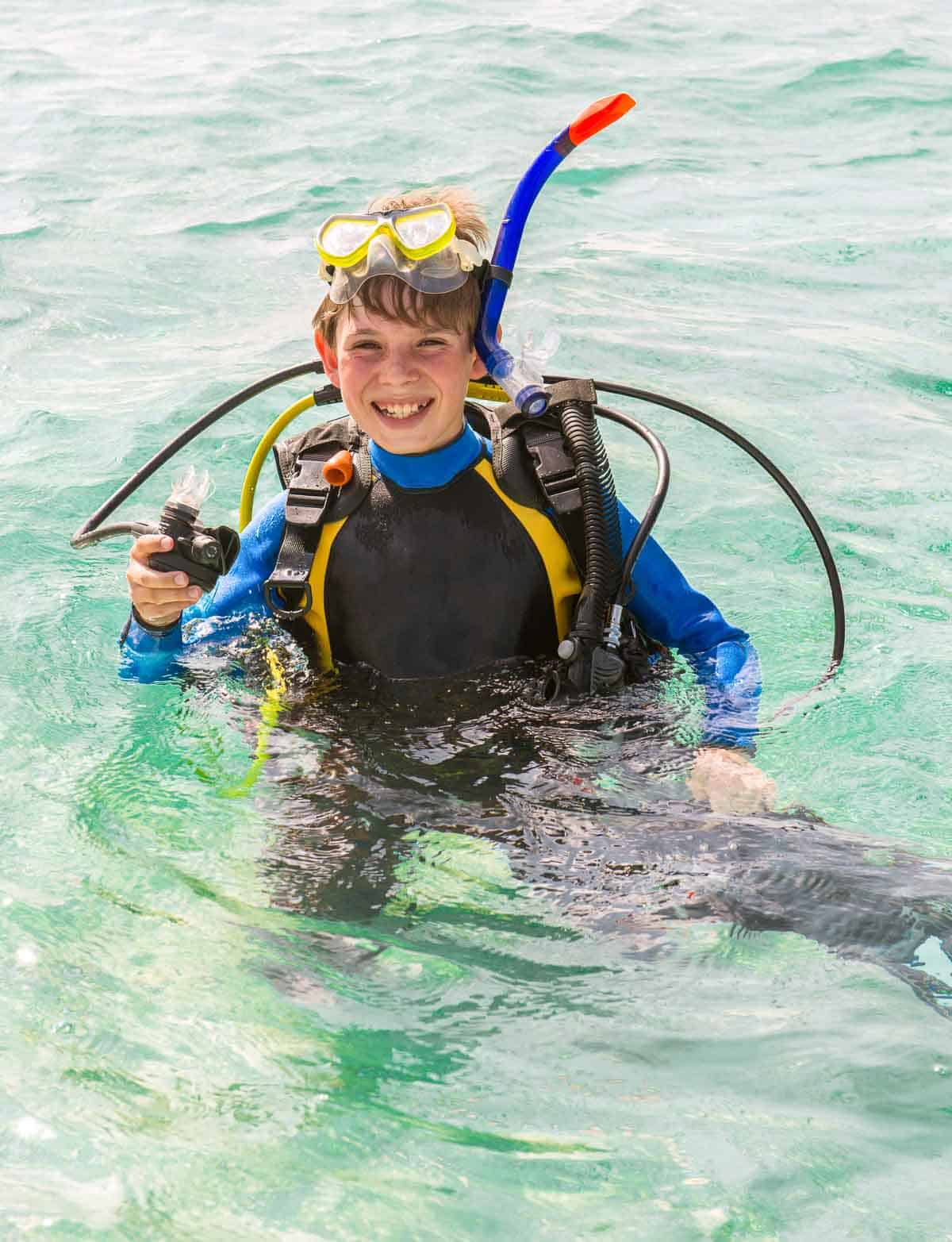If your child has expressed an interest in scuba diving, you might be unsure whether they are prepared emotionally and physically for the sport. Perhaps as a parent who loves scuba diving, you want to encourage your child to learn. Scuba diving for kids is a great way for them to experience the underwater world, but it’s not for everyone!
Ever wondered how old do you have to be to scuba dive? While there are minimum age scuba certification requirements, it really comes down to the individual child. For some children at eight years of age, they may be ready to take their first diving steps. For others, it could be putting them at significant risk.
In this article, we’ll discuss how old do you have to be to scuba dive and the minimum scuba certification age. We’ll also address the physical, health and emotional considerations that all parents should be aware of before allowing their child to dive.
HOW OLD DO YOU HAVE TO BE TO SCUBA DIVE
- How Old Do You Have to be to Get PADI Certified?
- How Old Do You Have to be to Get NAUI Certified?
- Physical and Healthcare Considerations for Scuba Diving Children
- Emotional Maturity Required from Scuba Diving Kids
- Children Dealing with Scuba Diving Emergencies
- What Sort of Scuba Diving Courses Are Available for Kids?
- Scuba Diving Certification Courses for Kids
- Final Thoughts
- FAQs
How Old Do You Have to be to Get PADI Certified?
PADI (Professional Association of Diving Instructors) enforces scuba diving age limits of at least 15 years of age before offering full Open Water Diver certification. However, they are welcome to begin the Open Water Diver online course from as young as 13.
PADI also offers a Junior Open Water Diver training program for children aged 10 to 14 years. It’s similar to the full Open Water Diver scuba certification course but with shallower dive limits. Children aged 10 and 11 can dive no more than 12 meters (accompanied by a PADI professional or certified guardian). Scuba diving kids aged 12 to 14 years are limited to 21 meters.
How Old Do You Have to be to Get NAUI Certified?
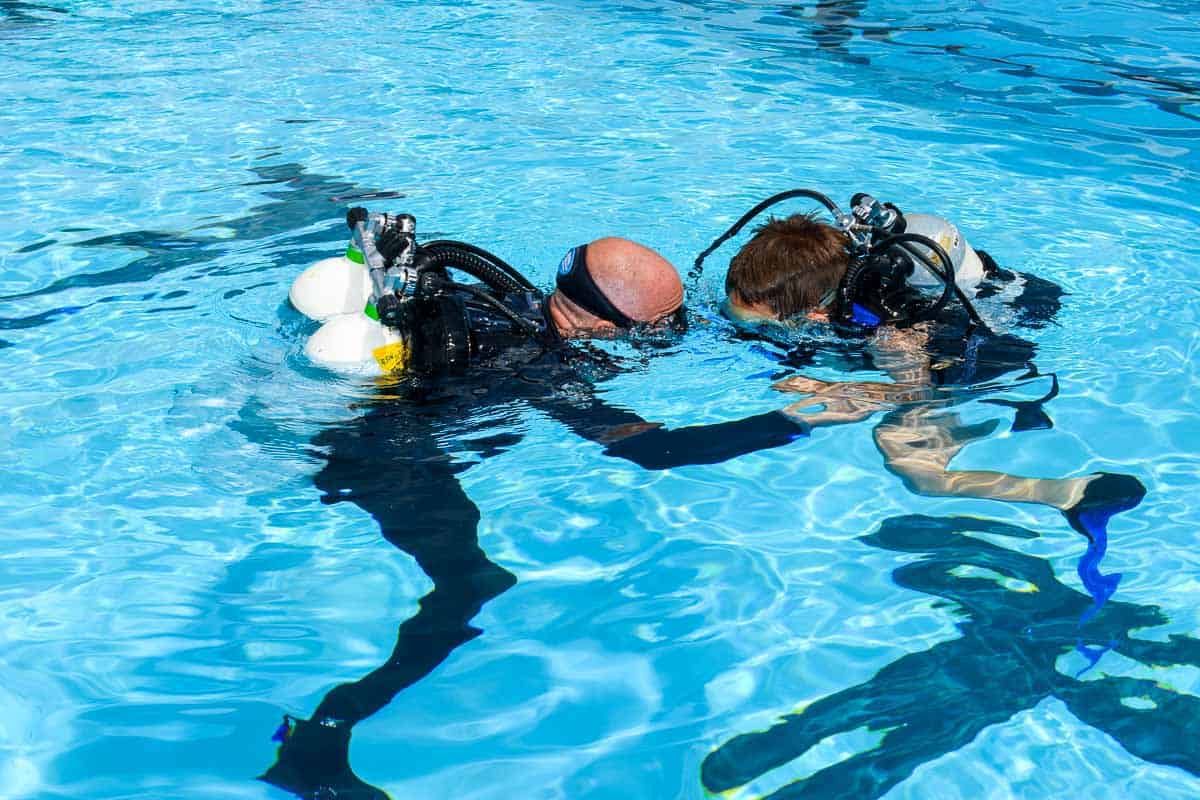
NAUI (National Association of Underwater Instructors) also offers a Junior Scuba Diver certification. Their scuba diving age limit is set at a minimum of 10 years old, with a depth limit of 18 meters. Children can then graduate to a full NAUI Scuba Diver certification at age 15. NAUI also requires that Junior Scuba Divers dive with a certified adult or guardian.
Physical and Healthcare Considerations for Scuba Diving Children
Every child physically develops at their own pace, which is why setting a minimum age for scuba diving is difficult. Certain parts of the body must be developed so the child can meet the physical demands of diving safely and without putting their health at risk.
The Eustachian tubes in children are usually narrower and smaller than in adults. This can lead to an increased risk of middle-ear infection and problems with equalizing. The upper and lower respiratory tract passages of children are also narrower compared to their associated air cavities. This makes children more susceptible to pulmonary barotrauma during rapid or excessive pressure changes. Scuba diving for children can cause greater damage to organs that are still developing, which isn’t a concern with fully-developed adult organs.
Something else to keep in mind with kids diving is that children sometimes have a small opening between the right and left upper chambers of the heart. Dives that result in a lot of venous bubble formation can put children at a greater risk of neurological decompression illness. Nitrogen bubbles in the small vessels supplying bone growth plates can also damage these tissues.
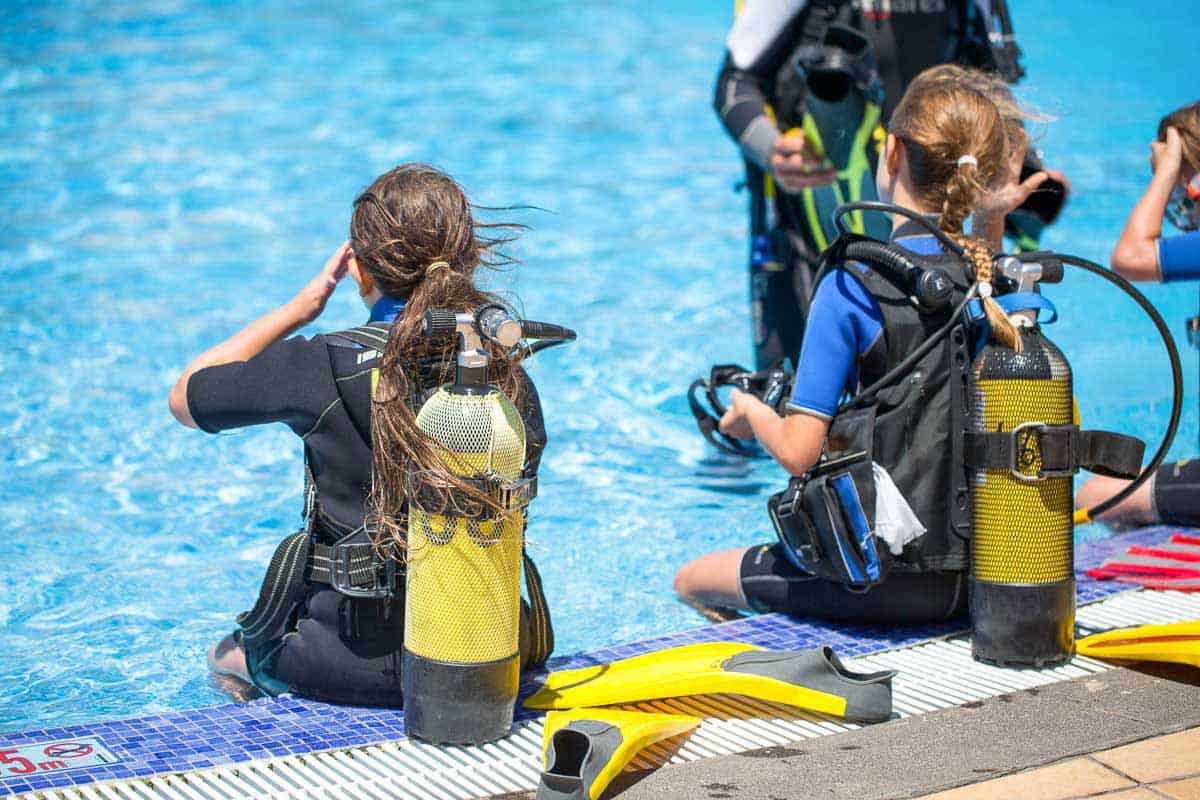
Aside from the health risks associated with kids scuba diving, parents should also take into consideration the equipment involved. Diving equipment tends to be heavy and not always available in children’s sizes. This can cause discomfort and add unnecessary strain on the child. In such conditions, they’re more likely to tire quickly underwater and be at increased risk of developing decompression sickness. Always invest in equipment that fits your scuba diving kid now, rather than oversized gear they are meant to grow into later.
Age is often used as a representation of a child’s physical strength. But while some children may be relatively strong at a young age, others will take longer to develop. Their introduction to scuba diving should be delayed until they are ready to manage the physical demands of the sport and can manage the equipment without difficulty.
Emotional Maturity Required from Scuba Diving Kids
Similar to the variations in the way children develop physically, their emotional development can also differ drastically from one child to the next. They must be capable of following instructions and understanding why depth limits are in place but also being able to make sound judgments underwater.
Panic is one of the leading causes of death in diving accidents and children are more susceptible to panic in the face of danger. Before parents allow their child to learn to dive, they should consider how they manage stressful situations and their ability to solve problems in a mature manner. Children who are impulsive and don’t understand their physical limitations are more likely to exhibit risky behavior, putting themselves and the divers around them in danger.
Children Dealing with Scuba Diving Emergencies
All scuba diving training covers what you need to do in an emergency, whether it’s yourself or your buddy in trouble. The ability of children to understand the warning signs and respond effectively can be the difference between life and death.
Both NAUI and PADI require their junior divers to be accompanied by a certified adult underwater. But what if that adult runs out of air or finds themselves in a situation where they need the child to take control? Determining whether your child is mature enough to deal with scuba diving emergencies that may arise is something all parents should seriously consider.
What Sort of Scuba Diving Courses Are Available for Kids?
Children as young as eight can try out scuba diving skills during short sessions where they’ll learn to equalize and basic underwater hand signals. Multi-day courses are also available where they can learn to clear their mask and operate their BCD.
One option is the PADI Bubblemaker program, which is limited to two meters depth. It’s designed for children as young as eight to develop their underwater skills in a safe environment. In addition to this is the PADI Seal Team program, which is also accessible to children eight years and over. It includes a range of underwater activities, including photography.
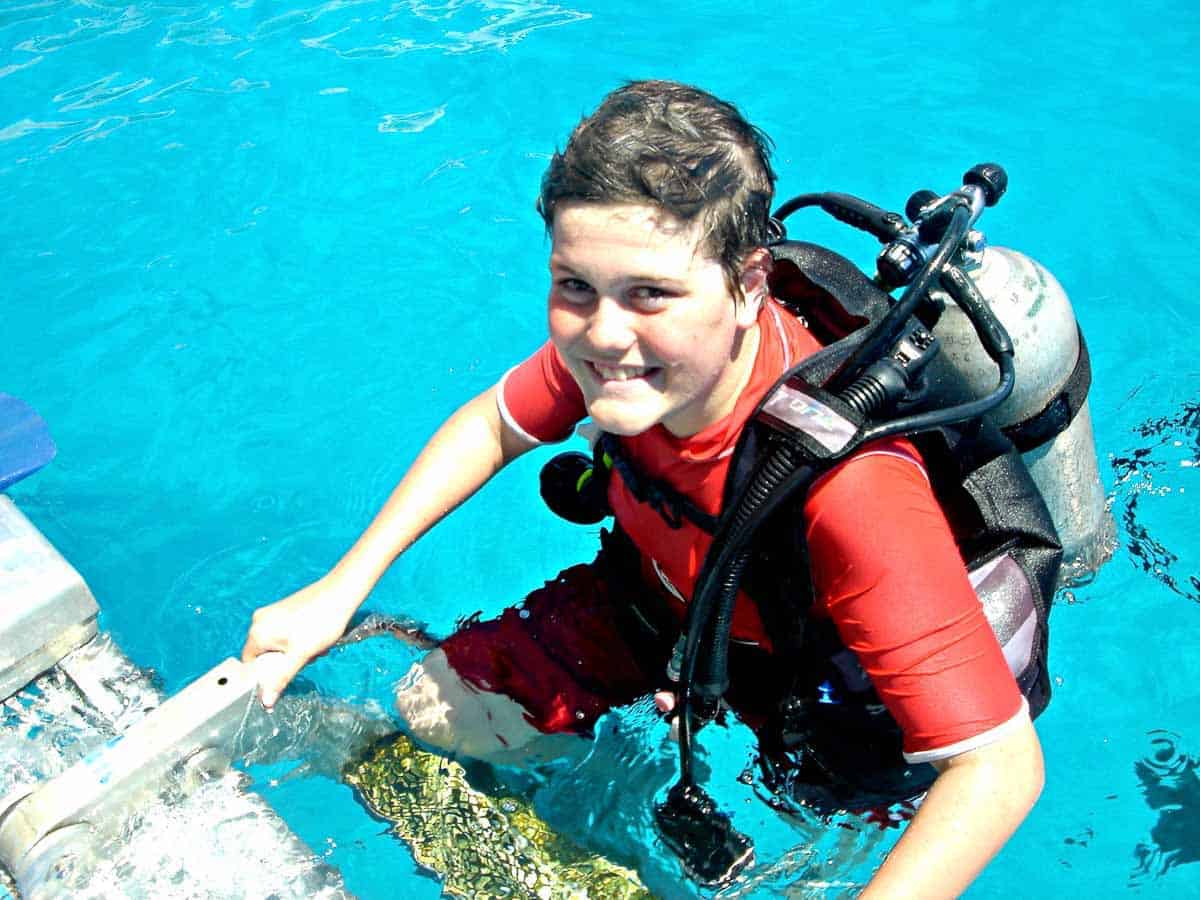
Scuba Diving Certification Courses for Kids
Once children reach 10 years of age, they are eligible to pursue a junior certification course with PADI or NAUI. This requires them to complete the same course work but they are restricted to shallower depths than adults, depending on their age. Most junior certifications can be upgraded to a full adult certification once the child reaches 15 years of age.
FINAL THOUGHTS
As a parent, you should decide whether your child is ready for scuba diving (both emotionally and physically) and that they have a desire to learn. A child should never be pressured into diving, particularly if they aren’t comfortable in the water. Someone who is stressed in the water is highly likely to panic if equipment fails or an emergency occurs. This can quickly lead to a near-drowning situation.
Learning to scuba dive also requires that they have a sufficient attention span, both in the classroom and in the water. Being able to retain information and follow instructions is essential for mastering diving skills. If your child has any existing medical conditions, such as ear problems or asthma, consult your doctor first. Not only could scuba diving jeopardize their health but they probably won’t enjoy the sport.
While there are scuba diving age restrictions in place, every child should be evaluated individually and only encouraged to dive when they are ready. If you’re uncertain, snorkeling is a great way for children to learn underwater skills, many of which can later be applied to scuba diving.
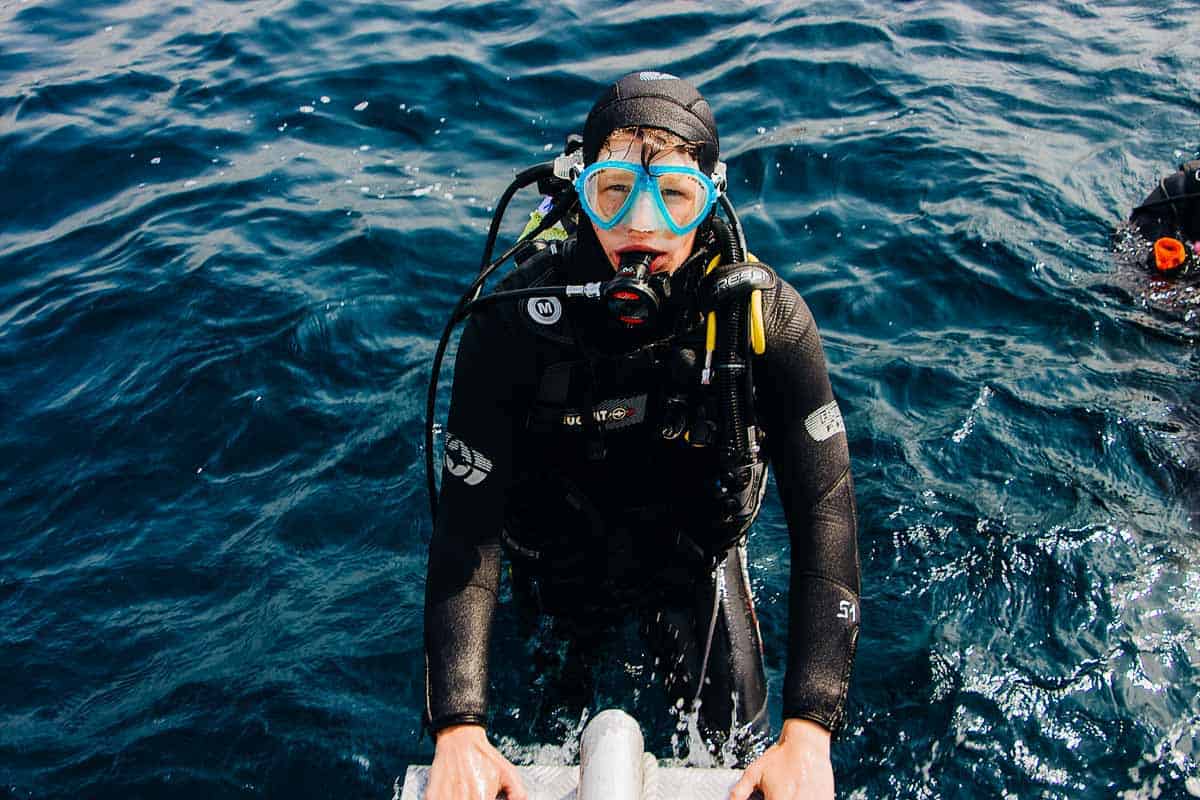
HOW OLD DO YOU HAVE TO BE TO SCUBA DIVE?
FAQs
1. Can you scuba dive without a license?
It is possible to scuba dive without a license or certification, but it can be dangerous to do so. All reputable dive centers and dive clubs will require that you have a valid certification before they will allow you to dive with them. Diving can also be fatal if you don’t understand the dangers involved and don’t know how to use your equipment properly. There are many mistakes that an unqualified diver can make that are addressed during certification courses.
It’s much wiser to invest in a certification course with one of the numerous diving schools around the world, such as PADI, SSI, and NAUI. They’ll equip you with the skills you need to dive safely and within recreational limits. Also, you’ll come away with a certification card that will enable you to dive around the world.
2. Can kids learn to scuba dive?
Yes, scuba diving age requirements state that children as young as eight years old can learn to dive. However, there are depth limits imposed by certification schools for different scuba diving ages. PADI limits eight-year-olds to two meters depth during their Bubblemaker course. Once children reach 10 years of age, they will reach the minimum PADI certification age. At this point, they can begin their Junior Open Water Diver training and go to 12 meters in depth. At 12 years of age, they are allowed to go to 21 meters in depth before receiving their full Open Water certification at age 15.
3. Can a 12-year-old scuba dive?
Yes, a 12-year-old can learn to dive with various certification schools, including PADI and NAUI. PADI’s Junior Open Water Diver certification allows 12-year-olds to dive to 21 meters in depth while NAUI limits them to 18 meters. With SSI, kids can participate in the Scuba Rangers program from ages 8 to 12 but are limited to a maximum depth of five meters. Alternatively, they can start SSI’s Open Water Diver certification as young as 10 years old.
4. What is the minimum age to scuba dive?
The scuba minimum age with a reputable dive school is eight years of age. But children under 15 are restricted to shallower diving limits than fully certified Open Water divers. At eight years of age, children can join PADI’s Bubblemaker program or SSI’s Scuba Rangers program to learn basic skills in the swimming pool. Once they reach 10 years of age, they can begin their Open Water certification at a junior level. For full certification, the scuba diving age minimum is 15 years old.
5. How old do you have to be to snorkel
As with scuba diving, the age that a child’s ready to start snorkeling differs between individuals. If your child is aged five and comfortable in a swimming pool, then it might be a good time to introduce them to snorkeling equipment. They can play around in the shallow end of a pool or even in the bathtub. Some will feel instantly comfortable breathing through a tube while others may find it difficult.
If your child feels uncomfortable breathing through a traditional snorkel and clearing a mask, then a full-face snorkeling mask [insert link] might be a good option. These are designed to cover the entire face, so the child can breathe normally and doesn’t have to worry about their mask fogging up.
SOURCES
How old do you have to be to Scuba Dive
- Scuba Diver Beginner Certification Course, padi.com
- Get Certified/Scuba Diver, naui.com
- Is Your Child Ready to Scuba Dive?, dansa.org
- Diving Risk Factors, thediverclinic.com
REACH OUT
We hope you found this content informative! If you are looking to expand your scuba knowledge base further, we have written a similar article on the recommended best practices of scuba diving during pregnancy. We have also written some enlightening conservation pieces on the incredible marine mammals and awesome sharks that give our oceans so much character.
As always, we create our content with you, our fellow ocean lovers, in mind. So, feel free to tell us how we did. Did you find what you were looking for? Did it help you arrive at a decision? Did we miss anything out? We’d love to hear from you below.
Thanks for reading and we hope your next dive is a great one – keep diving Blue!


